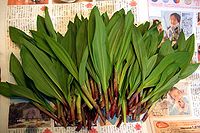- Ainu cuisine
-
Ainu cuisine is the cuisine of the ethnic Ainu in Japan. The cuisine differs markedly from that of the Wajin, or ethnic Japanese. Ainu cuisine, for instance, does not prepare raw meats like sashimi instead preferring to boil, roast or cure meat. The island of Hokkaidō in northern Japan is where most Ainu live today; however, they once inhabited most of the Kuril islands, the southern half of Sakhalin island, and parts of northern Honshū Island.
Until recently, the Ainu were thought to be exclusively a hunter-gatherer society, but recent excavations on the Hokkaido University campus have revealed extensive fossilized grains. There are very few Ainu restaurants in the world, such as Ashiri Kotan Nakanoshima in Sapporo, and Poron'no and Marukibune in Ainu Kotan, Hokkaidō.
Contents
Ingredients of the Ainu Cuisine
Crops
Wild plants
- Pukusa, a wild garlic also known as kitopiro, gyouja nin'niku (ギョウジャニンニク or ascetic garlic) and ainu-negi (アイヌネギ or ainu negi) in Japanese. Pukusa is very similar to ramps found in Canada and the United States in taste, texture and appearance.
Animals
Hunting
Recipes and dishes of note in Ainu cuisine
- Kitokam - a sausage flavored with pukusa
- Munciro sayo - millet porridge
- Ruibe - a thin slice of frozen salmon
- Sito - a dumpling made from rice or millet
- Ohaw or rur, a savory soup flavored with fish or animal bones. Kelp is also used to add flavor to the stock. Unlike the majority of the traditional Japanese soups, the Ainu do not use miso or soy sauce in their soups.[1] The solid ingredients such as meat, fish, vegetables and/or wild edible plants are added to the stock.
- cep ohaw - salmon soup
- kam ohaw - meat soup
- yuk ohaw - venison soup
- pukusa ohaw - pukusa soup
- pukusakina ohaw - anemone soup
- Munini-imo [munin ("fermented" in Ainu) + imo ("potatoes" in Japanese)], savory pancakes made with potato flour. Potatoes are first fermented underground by the repeated freeze-thaw cycles, and then milled and dried. The flour is soaked in water in order to remove the bitter taste and then baked on a griddle like a thick pancake. The potato flour made with this process can be easily stored for at least twenty years. The munini-imo is very sticky like mochi.
Sources
Categories:- Japanese cuisine
- Ainu culture
- Indigenous cuisine
Wikimedia Foundation. 2010.

